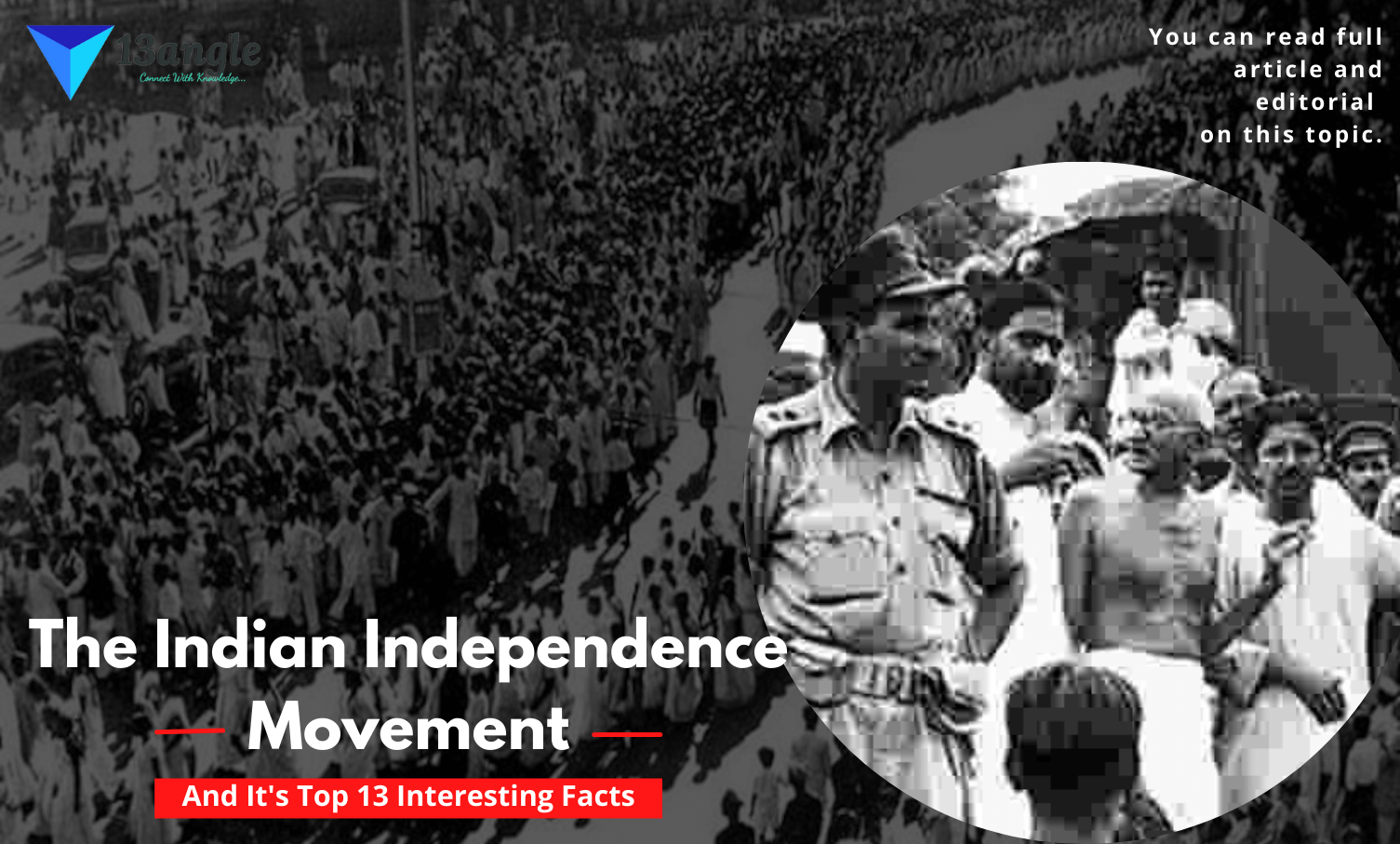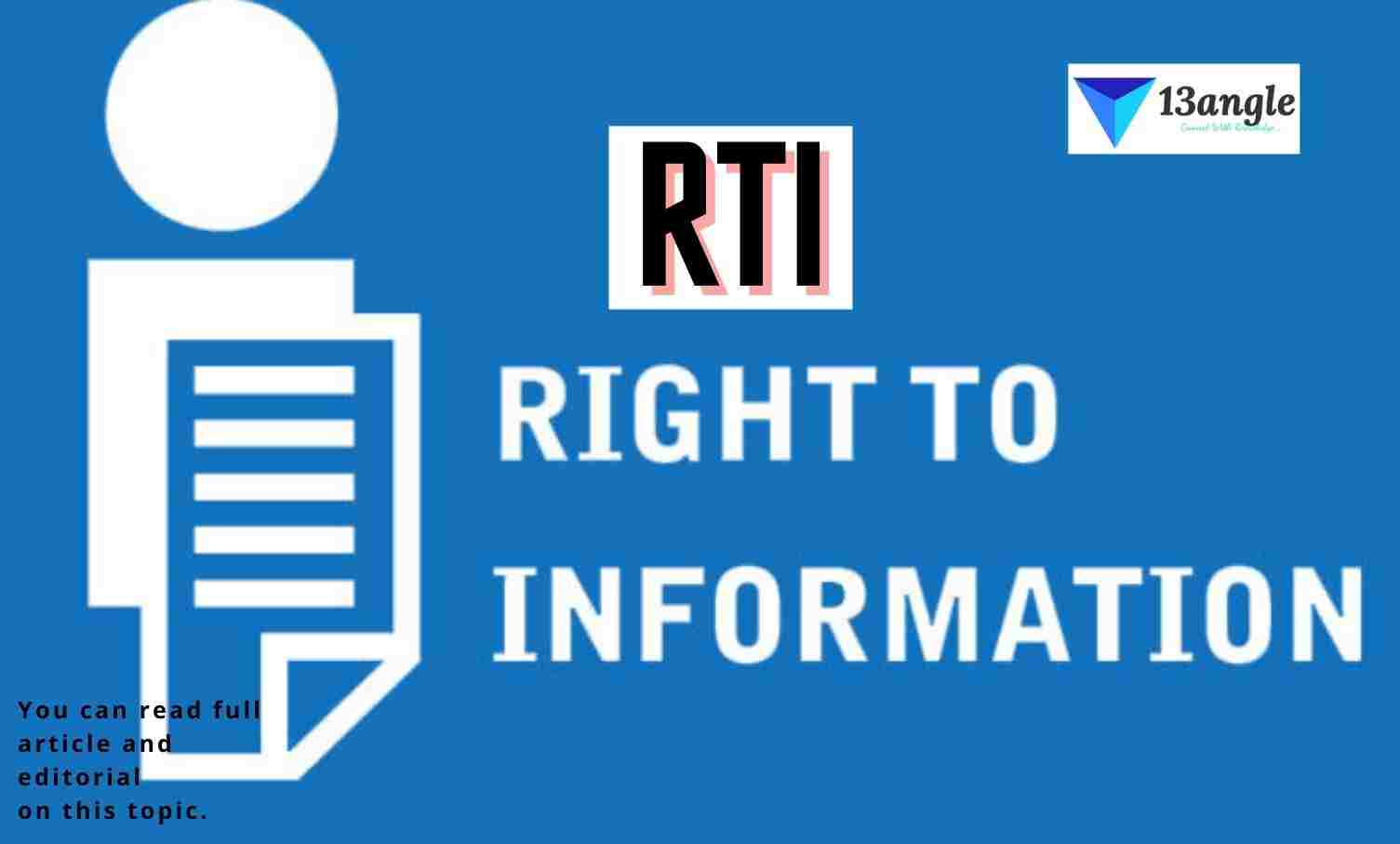
What Is Police Commissionerate System?
Commissioners of police are also commonly referred to as Police Commissioners. it is possible for the Commissionerate system to combine several adjoining districts under it. In India, IPS officers are the ones who head the police force in a Commissionerate. They hold executive powers that are superior to those that are available to a Superintendent of Police (SP) or Senior Superintendent of Police (SSP) as in charge of the police force of a district. This system is enforced in various cities in 16 states of the country.
The Commissionerate system splits a District into two parts from the point of view of policing, The portion of the city that constitutes the big, urbanized settlement becomes a geographic area where the magisterial responsibilities of the district collector are transferred to the Commissioner of Police. And district collector will look after the development and revenue-related functions.
Under the constitution, the police is a subject that is governed by the states, each state has its own police forces. Policing is based on the police act of 1861. Under the 7th schedule of the constitution ‘Police’ is under the state list, meaning that individual states typically legislate and exercise control over the subject.
Need To Introduce The Commissionerate System

There are various committees formed to suggest police reforms have recommended the implementation of the police Commissionerate system in those cities that have witnessed rapid urbanization and have a population of more than 10 lakhs. In the 6th report of the National Police Commission, it was stated that compared to the police in districts, police in Commissionerate in small areas had a better account of themselves, and they performed better. Changing dynamism and increasing complexities of security threats, the report also noted that in urban areas the changing dynamics and increasing complexities of security threats required a rapid and prompt reaction. Leaving very little time for discussion and debate, while urging that the Commissionerate system can be implemented in urban areas with a population of 10 lakh and above. This also solves the issue of lack of understanding, however, in districts where the SPs and DMs are not on the same page, orders to move quickly are rarely provided on a timely basis, which worsens the situation. By amending certain sections of the Code of Criminal Procedure, Police Act, Motor Vehicles Act, National Security Act, State Security Act, Prisoners Act, Immoral Traffic Prevention Act, Government Secrets Act, etc., police officers under this Commissionerate system will be granted additional powers.
It seems doubtful that the installation of a police Commissionerate alone will result in safer and better-policed cities; a lot more reforms are necessary.
There is a need to create a strong civil society with a high level of activism and participation by non-governmental organizations. It can effectively serve as a check on police forces.
As public order and police are included in the Seventh Schedule of the Constitution state list, the Government is required to implement necessary police reforms.
Technological advancements present administration with new challenges. Therefore, the planning, governance, and delivery of numerous municipal services to a large population need the establishment of strong municipal architecture.
State Those Who Have Commissionerate System Implemented
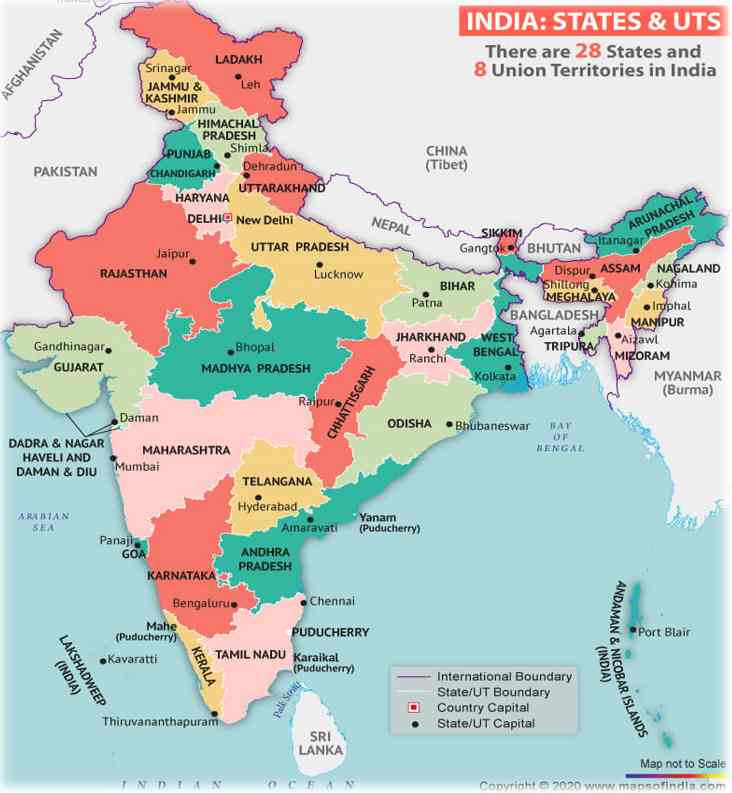
Sr. No. | States With Commissionerate System |
1. | Andhra Pradesh |
2. | Assam |
3. | Gujrat |
4. | Haryana |
5. | Karnataka |
6. | Kerala |
7. | Madhya Pradesh |
8. | Maharashtra |
9. | Nagaland |
10. | Odisha |
11. | Punjab |
12. | Rajasthan |
13. | Tamil Nadu |
14. | Telangana |
15. | Uttar Pradesh |
16. | West Bengal |
- These are the 16 states those who have the Commissionerate system implemented.
States And Union Territories That Didn’t Implement Commissionerate System
Sr. No. | States and Union Territories |
1. | Arunachal Pradesh |
2. | Bihar |
3. | Chhattisgarh |
4. | Goa |
5. | Himachal Pradesh |
6. | Jharkhand |
7. | Manipur |
8. | Meghalaya |
9. | Mizoram |
10. | Sikkim |
11. | Tripura |
12. | Uttarakhand |
13. | Andaman and Nicobar Island |
14. | Chandigarh |
15. | Dadar and Nagar Haveli and Daman and Diu |
16. | Jammu and Kashmir |
17. | Ladakh |
18. | Lakshadweep |
19 | Puducherry |
- This is the list of 12 States and 7 Union Territories those who don’t have the Commissionerate System Implemented.
Difference Between Dual System And Commissionerate System
Dual System | Commissionerate System |
A dual system means that there is a separation of powers between the district magistrate and the police | Under the Commissionerate system, the commissioner of police exercises the Magisterial powers and responsibilities of a District Magistrate in addition to policing. |
The District Magistrate is responsible for issuing arrest warrants and licenses, while the SP investigates criminal activity and makes arrests. | The power of policing and magistracy is concentrated under a single authority. |
The dual system is primarily intended to reduce the concentration of power and increase police accountability to the District DM. | There is a higher concentration of power in this system |
SP is assisted by Additional/ Assistant/ Deputy SPs, Inspectors, and constabulary | Commissioner is assisted by Special/ Joint/ Additional/ Deputy / Assistant Commissioners, etc. |
Difference Between Commissioner Of Police And Director General Of Police (DGP)
Commissioner of Police | Director General of Police |
In major cities, districts, etc., the Commissionerate is led by the Commissioner of Police. | The Director-General of Police leads the entire state’s Police force. Each state has its own Director General of Police (DGP). |
The position of Commissioner of Police is not a rank, but a posting. | Director-General of Police is not an assignment, but rather the Highest Rank in the State Police Hierarchy. |
In most situations, the Police Commissioner reports to the Director-General of police (DGP). There is, however, one exception: The Commissioner of Police and Director General of Police of the Delhi Police are identical. | The Director-General of Police (DGP) is the highest-ranking police officer in the State, holding a three-star rank. |
And Commissioner of police reports to the Home Secretary (who is an IAS). | As the highest-ranking officer, the Director-General of Police reports to the Chief Secretary of the State (who is an IAS). |
Hierarchy Of The Police System In India
| Grade/ Scale (Level on pay Matrix) | State Police Ranks | Commissionerate Postings |
| Junior time scale (Pay level 10) | Assistant Superintendent of Police (ASP-under trainee) / Deputy Superintendent of Police (DySP) / Sub-divisional Police Officer (SDPO) | Assistant commissioner of police (Asst. CP) |
| Senior time scale (Pay level 11) | Additional Superintendent of Police (Addl. SP) | Additional deputy commissioner of police (Addl. DCP) |
| Junior administrative grade (Pay level 12) | Superintendent of Police (SP) | Deputy commissioner of police (DCP) |
| Selection grade (Pay level 13) | Senior Superintendent of Police (SSP) | Deputy commissioner of police (DCP) |
| Super time scale (DIG/Conservator grade) (pay level 13A) | Deputy Inspector General of Police (DIGP) | · Additional Commissioner of city police (Addl. CP) in Delhi, Gujarat, Maharashtra, Odisha, and Rajasthan. · Joint Commissioner of city police (Jt. CP) in West Bengal, Tamil Nadu, Karnataka, and Haryana. |
| Senior administrative grade (above super time scale) (Pay level 14) | Inspector General of Police (IGP) | · Joint Commissioner of city police (Jt. CP) in Delhi, Gujarat, Maharashtra · Additional Commissioner of city police (Addl. CP) in Kolkata, Chennai, Bangalore |
| Higher administrative grade (above super time scale) (Pay level 15) | Additional Director General of Police (ADGP) / Director General (DGP) | Commissioner of city police (CP). |
| Apex scale (Pay level 17) | Director General of Police (DGP) | (exceptions) · Commissioner of Police (CP) of Delhi. · Commissioner of Police (CP) of Mumbai. |
Issues Faced Due To Commissionerate System
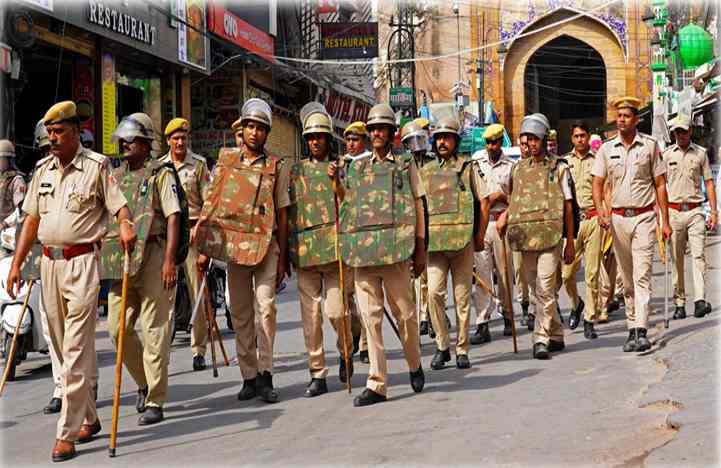
There is a lack of public confidence in police- Since colonial times, the Police have not had the reputation of an institution that is pro-poor and pro-people. People typically bring their complaints to the magistrates because they have less faith in the police. People are more comfortable talking with the magistrates since they contribute to societal equilibrium.
Giving more power to police- In the absence of defined rules of transparency and accountability imposed on autonomous police machinery, the Police may become, on the one hand, the servants of the governing political dispensation and, on the other, a repressive government apparatus. This will place huge power in the hands of the police which already lacks confidence in the public.
Overlapping Jurisdiction- Even though the Supreme Court has made a distinction between law and order (police-related) and public order, the distinction remains unclear (responsibility of the District Magistrate). However, these two domains overlap, so any crime-related incident might readily become a public order issue.
The right to Protest comes from the freedom of speech and expression, and as a democratic society, protest is believed to be valid. Therefore, the District Magistrate’s role in maintaining public order serves as a check on the police force’s unbridled authority. This approach is more effective in states with a high literacy rate and citizens who have extensive knowledge of the law and their fundamental rights.
Issues such as delegation of authority and improved integration must be addressed.
Issues Faced Due To Dual System

There is a delay in reaction time- Under the Dual system, police must acquire approval from executive magistrates before undertaking any activity related to maintaining public order. This has a negative effect on efficiency.
There is a diversion of Attention- Through a large array of government programs, the government intends to bring development to the most remote regions of the nation. The District Magistrate has an enormous task due to the execution of these programs. Therefore, the need for DM to maintain public order diverts attention away from its developmental responsibilities.
There are issues faced because of accountability- As a result of this dual system of police, it is difficult to determine who is responsible for any mismanagement of law-and-order crises, such as protests or riots.
How Does Commissionerate System Empower The Police?
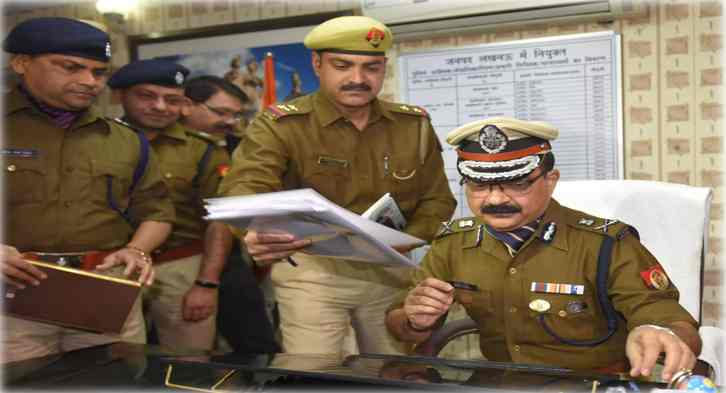
Under the Commissionerate system, the police commissioner exercises the magisterial powers of a district magistrate. These powers are likewise available to any subordinate officer with a rank above that of Assistant Commissioner of Police.
This essentially means that these police officers now have the authority to make preventive arrests, imposing Section 144 of the CRPC Act, and start chapter proceedings, which include sending show cause notices to individuals and requesting that they sign bonds for good behavior with or without sureties in the public interest.
Additionally, the police have the authority to conduct externment procedures and execute written orders removing a person from the Commissionerate for a maximum of two years.
Conclusion
- India’s existing police system is suffering from several flaws, including problems with the police organization, environment, infrastructure, and understaffing, as well as antiquated weaponry and intelligence-gathering tactics, a scarcity of manpower to corruption, in the country’s police force must be in a good shape. Therefore, comprehensive reforms of the police are imperative. Since Police, Law, and Order are subjects on the state list, the federal government can begin by urging all states to implement the supreme court’s recommendations.
Top 13 Facts About Police Commissionerate System
It will be the commissioner of police (CP) who will issue orders to maintain peace.
The British bought this Commissionerate system first in Kolkata and followed it in Mumbai and Chennai presidencies.
Delhi was turned into a Commissionerate during the Morarji Desai Regime.
According to the Commissionerate system which has been implemented in various states, the CP must report to the government in place of the DM.
Policing Act mandates Commissionerate System, in cities with a population of over 10 lakhs.
Even after having a population of over 10 lakhs, Bihar doesn’t have the Commissionerate system implemented.
A Commissioner of Police is selected from the rank of Deputy Inspector General or higher and is assisted by Special/Joint/Additional/Deputy Commissioners under this system.
Patna, Ghaziabad, and Agra are Indian cities with populations over 1.5 million without a Commissioner of Police system.
The positions of Commissioner of Police (CP) of Mumbai and Director General of Police (DGP) of Maharashtra are held by two distinct officers of the Director General (DG) level.
The Mumbai CP is one of the country’s few CPs who does not report to the state DGP. Both the Mumbai CP and the Maharashtra DGP report to the Additional Chief Secretary of the Maharashtra Home Department.
This Commissionerate system splits a district into two parts from the point of view of policing.
CP can slap a penalty if prohibited items are taken into prison or rules for communication with prisoners are violated.
CP can take actions against suspected foreigners staying in hotels, their departure, or documents with them under the foreigners Act, of 1946
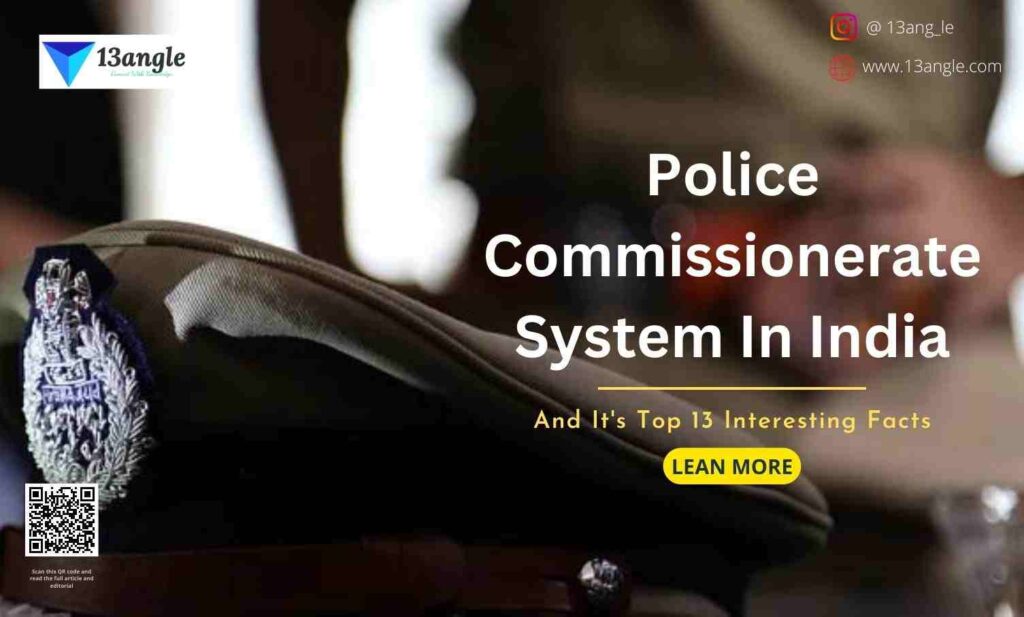
For deep details, you can read the full article. Click the link below :


